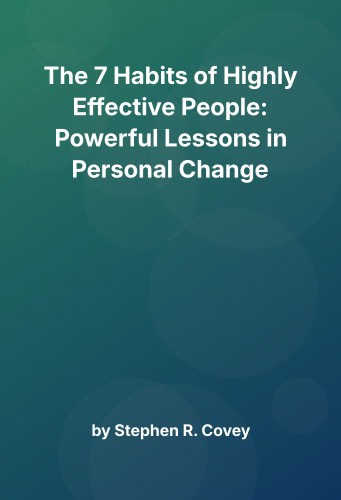The 7 Habits of Highly Effective People: Powerful Lessons in Personal Change
By Stephen R. Covey
Introduction
Stephen Covey’s The 7 Habits of Highly Effective People has become one of the most influential self-help and leadership books in modern history. With over 25 million copies sold, the book outlines a holistic, principle-centered approach to personal and interpersonal effectiveness.
Rather than offering quick-fix techniques, Covey focuses on deeply rooted paradigms — encouraging readers to align their character and behavior with universal principles like integrity, fairness, and human dignity.
Paradigm Shift: Inside-Out vs. Outside-In
Covey begins by explaining the need for an “inside-out” approach to change. Most people seek external improvements — better relationships, more productivity — without changing their internal paradigms.
True effectiveness begins with private victories before public victories. Habits, Covey argues, are the intersection of knowledge, skill, and desire — and changing them is a process of growth and commitment.
Habit 1: Be Proactive
“I am not a product of my circumstances. I am a product of my decisions.”
Being proactive means taking responsibility for your life. Reactive people are driven by feelings and external conditions; proactive people are guided by values.
Covey introduces the Circle of Concern vs. Circle of Influence:
- Focus on what you can control (influence), not what you can’t (concern).
- As you focus on your influence, it grows; dwelling on concern shrinks your power.
Proactivity is the foundation of self-leadership and personal accountability.
Habit 2: Begin with the End in Mind
“All things are created twice: first mentally, then physically.”
This habit is about defining your personal vision and goals. Covey encourages writing a personal mission statement — a document that clarifies your principles and aspirations.
He emphasizes principle-centered living over goal-centered or people-centered lives. When your values align with your actions, you build true effectiveness.
Key tools:
- Visualization of long-term outcomes
- Alignment between daily actions and ultimate goals
- Role definition across life (e.g. parent, manager, community member)
Habit 3: Put First Things First
“The key is not to prioritize what’s on your schedule, but to schedule your priorities.”
This is the habit of time management — but at a deeper level, it’s about integrity and execution.
Covey introduces the Time Management Matrix:
- Quadrant I: Urgent and Important (crises)
- Quadrant II: Not Urgent but Important (planning, relationship-building)
- Quadrant III: Urgent but Not Important (interruptions)
- Quadrant IV: Not Urgent and Not Important (time wasters)
Effective people live primarily in Quadrant II — prioritizing planning, prevention, and long-term value.
Private Victory Recap
Habits 1–3 form the Private Victory — mastering self. You move from dependence to independence by:
- Taking responsibility (Habit 1)
- Clarifying purpose (Habit 2)
- Executing on priorities (Habit 3)
Only once you lead yourself can you effectively lead others.
Habit 4: Think Win-Win
“Win-win is a frame of mind and heart that constantly seeks mutual benefit.”
Interpersonal leadership starts here. Win-win is based on abundance mentality — the belief that there’s plenty for everyone.
Other paradigms:
- Win-Lose: authoritarian, competitive
- Lose-Win: self-sacrificing, people-pleasing
- Lose-Lose: destructive, vengeful
- Win: selfish, independent success
Covey outlines five dimensions of win-win:
- Character (integrity, maturity)
- Relationships (trust accounts)
- Agreements (clarity of expectations)
- Systems (structures that reward collaboration)
- Processes (seeking mutual understanding)
Habit 5: Seek First to Understand, Then to Be Understood
“Most people do not listen with the intent to understand; they listen with the intent to reply.”
This habit is about empathetic listening — truly hearing others before offering advice or opinion.
Covey distinguishes between:
- Autobiographical responses (interpreting based on your own experience)
- Empathic responses (entering the other person’s frame of reference)
Understanding builds trust. Once others feel understood, they are more open to your influence — creating better collaboration and problem-solving.
Habit 6: Synergize
“Synergy is better than my way or your way. It’s our way.”
Synergy is the essence of creative cooperation — where the whole is greater than the sum of its parts.
This requires:
- Valuing differences
- Open-minded dialogue
- Mutual respect
Covey compares synergy to nature — like ecosystems, diversity strengthens outcomes. Synergizing is not compromise; it’s third-way thinking — finding solutions neither party imagined alone.
Public Victory Recap
Habits 4–6 form the Public Victory — interdependence. You succeed with others by:
- Seeking mutual benefit (Habit 4)
- Listening first (Habit 5)
- Creating synergistic relationships (Habit 6)
The public victory is not possible without the private victory — you must be self-led to lead together.
Habit 7: Sharpen the Saw
“Give me six hours to chop down a tree and I will spend the first four sharpening the axe.”
This is the habit of self-renewal. It encompasses four dimensions:
- Physical — exercise, nutrition, rest
- Mental — reading, learning, problem-solving
- Emotional/Social — relationships, service, empathy
- Spiritual — purpose, reflection, values
Regular renewal in these areas sustains all the other habits. Neglect leads to burnout; investment leads to growth.
Final Thoughts: The Upward Spiral
Covey ends by describing growth as an upward spiral — learning, committing, and doing.
Effectiveness is not a destination, but a lifelong process. As we internalize and apply these habits, we evolve in maturity, integrity, and impact.
Key Takeaways
- Effectiveness starts with self-mastery — taking ownership, clarifying values, and living with integrity.
- Strong relationships are built on trust, empathy, and mutual respect.
- Lasting change requires habits — consistent patterns of behavior rooted in principle.
- The 7 Habits provide a comprehensive framework for leading yourself and others with purpose and effectiveness.
The 7 Habits of Highly Effective People remains one of the most powerful guides to personal leadership ever written. It blends timeless wisdom with practical structure — helping readers navigate life with intention, resilience, and integrity.

